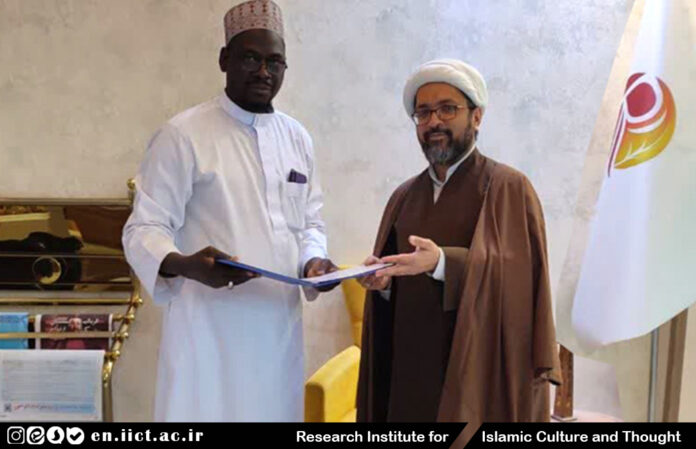According to the public relations report of the Research Institute of Islamic Culture and Thought, a letter of understanding for scientific and international interactions was concluded with the representative of the World Assembly of the Ahl al-Bayt in Mali.
Hojjat al-Islam wal-Muslimin, Dr. Mohammad Kashizadeh, the head of the international scientific interaction department of the institute, announcing this news, stated:
In line with the major goals and policies of the World Assembly of the Ahl al-Bayt in Mali and the Research Institute of Islamic Culture and Thought, and for the optimal utilization of the existing capacities to promote research-educational cooperation, a letter of understanding was proposed and with the cooperation of the parties, its provisions will be operationalized within separate contracts.
This letter of understanding was concluded between Dr. Mahdi Abbaszadeh, the assistant manager of Research Institute of Islamic Culture and Thought, and Adam Sangari, the president of the World Assembly of Ahl al-Bayt in Mali, as follows:
Article 1 – The topic and keystones of cooperation
- Cooperation in designing and carrying out international scientific activities using the educational and research capacities of the two parties.
- holding electronic/virtual courses at the master’s degree and doctoral level in the agreed fields, as well as holding short-term and long-term training courses within the framework of the existing rules.
- cooperation in international translation and publication of selected works in required foreign languages.
- Exchanging professors for carrying out research and educational affairs.
- Exchanging related scientific-research information (books, journals and publications, articles, theses, software and databases) within the accepted framework of the two parties;
- Holding joint scientific-research conferences and meetings.
- Guiding and supporting academic theses, especially in master’s and doctoral degrees, in line with the research needs of the parties.
- Planning mutual scientific visits for professors and students within the accepted framework of the two parties.
Article 2 – Duration of the letter:
- The period of the letter of understanding is set for three years from the time of signing and can be revoked with the prior notice of the parties and can be extended by mutual consent.
Article 3 – Implementation method:
- In order to operationalize the activities mentioned in Article 1 , a committee named “Committee of Joint Cooperation” made of representatives of both parties will be formed after signing the letter and will proceed to draw up joint contracts.
Article 4 – Others:
- signing this letter does not cause any specific financial obligation for both parties. All the programs and their costs are to be reviewed and agreed upon in each case.
- Should there be benefits from the implementation of joint projects and collaborations, decision will be made based on the mutual consent.
This letter was signed in 4 articles, 10 clauses and two copies, each of which has a single provision, by both parties on 13th Bahman / 2nd February 2023 and is valid from this date.




